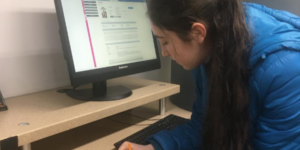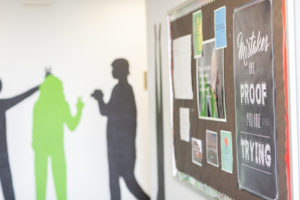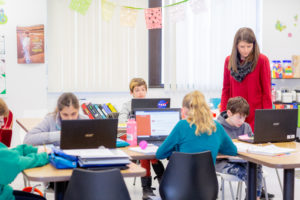Academics
The Sycamore School was founded on the fundamental belief that learning can be engaging, enjoyable and personal. We encourage students to be active participants in their education through our student-driven learning model. Throughout high school, TSS students are continuously presented with opportunities to guide their learning to topics and areas of interest while developing the core competencies necessary for graduation. The culmination of choices and the final demonstration of mastery in the core competencies is a final year Capstone Project for our high school students. Passion Project One of the core tenets of Mastery-based learning is applying skills to real world problems. In order to demonstrate this skill, our students are asked to create and complete an academic capstone project. Students pick a topic they are passionate about and create a project around that passion. Applied Learning Capstone projects require students to use the academic and socio-emotional competencies they’ve built…
Read MorePublic schools in our area are asking parents to make a choice for fall: keep your child/ren home for 100% virtual, or choose a hybrid model where they are in school for a couple of days, and virtual the rest of the week. It’s a difficult choice for many reasons – and a large one is the uncertainty. How long will this last? Are you equipped to manage your kids on your own at home? What if you send them to school and they get sick? What if they start the year at school but then it shuts down again? The lack of certainty is maddening…and can be frightening. At The Sycamore School, we are planning for every contingency. While we can’t offer certainty about how the pandemic will play out in our community this fall, we can offer our families the peace of mind that we are capable and…
Read MoreThe week of March 9th felt like a month. At the beginning of the week, the coronavirus still seemed at arms length. By Wednesday evening it became clear to me that we would need to shut down our school facility and support our students remotely sooner, rather than later. On Thursday morning, I explained the situation to our students and crafted a letter to parents. That Thursday afternoon, I held a staff meeting to flesh out the details of our remote learning. All week, staff had been bouncing around ideas. Our challenge? How to continue the same level of personalized educational support and guidance remotely. Fortunately, all of our students had laptops and were accustomed to doing the bulk of their work on a computer; and we were already on a google classroom platform, so we spent the next two days teaching students how to navigate google chat and hangout. …
Read MoreThe Sycamore School Announces Changes In Response To Coronavirus After much deliberation, we have decided to move to distance learning and instructional support starting Monday, March 16th. The TSS facility will be closed until April 14th. This means that we’ll be supporting student learning remotely for the three weeks up until spring break. This is a fluid situation, so we can adjust based on guidance from the Centers for Disease Control and Prevention (CDC), World Health Organization (WHO), and the US Department of State. All after school clubs and TSS events are cancelled through April 14th. Please note, we will continue to review applications for the 2020-21 school year during this period.
Read MoreMore and more frequently, parents of young students are pushing for their child to be identified as “gifted and talented”. Parents might think they are benefitting their children by advocating for that label and, to be honest, parents like the recognition themselves. We must have done all the right things if our child is identified as “gifted and talented” at an early age. But is this what’s best for our children? An article in Time Magazine speaks to our country’s dated and erroneous idea that learning potential is a fixed trait and cannot be cultivated. This results in bright students perpetually striving to prove their worthiness. It also channels educational resources to a small segment of students, failing to challenge and inspire the rest of our youth. At the heart of the article is three decades of research by Stanford psychologist Carol Dweck and her work on growth…
Read MoreLate, Lost or Missing Homework? Uncovering and Addressing Executive Functioning Struggles In Students Another week and another missing assignment in the grade book for your student. It seems like all their peers complete and turn assignments in on time, so why is it so hard for your child? Late, lost or forgotten homework can be a sign that your student is struggling with executive functioning skills, which are the building blocks of productivity. Executive functioning allows you to organize your day, plan long and short-term projects, and remember to complete tasks. The National Center for Learning Disabilities defines “Executive Function” as a “set of mental processes that helps us connect past experience with present action.” How do you determine if your student’s struggles are age-appropriate or if they are a symptom of an executive function issue? One option is to ask your school to do an evaluation, or student…
Read MoreOne of the things I love about summer is that I’m able to read a lot. I lean toward mysteries and modern fiction. This summer, I branched out a little and read a few young adult books, which were really good. Below are several lists of recommended books. Some are for parents, others are for kids, and some are for everyone. The children/teen/tween list my two kids helped me compile. It’s a list of their favorite books, from grade school to high school. We had a fun time creating it. I hope you find some books you enjoy. Happy reading! Books on parenting: How to Raise an Adult by Julie Lythcott-Haims Mindset: The New Psychology of Success by Carol Dweck Parenting Teens with Love and Logic: Preparing Adolescents for Responsible Adulthood by Foster Cline & Jim Fay The Self-Driven Child: The Science and Sense of Giving Your Kids More Control…
Read MoreA recent Washington Post article, by Jacque Gorelick, There is no room for average students these days. Here’s why that worries me.” highlights many of the reasons that I started The Sycamore School. I saw a critical need to respond to the stress and pressure being placed on students at increasingly younger ages. As Gorelick writes, “Kindergarten is the new first grade…” And with middle school students being expected to take multiple high school level courses, “… middle school is engineered as a fast track to the Ivy Leagues.” While there certainly is room for acceleration in our schools, it should not be the standard. A child who is strong in writing or reading should not be pushed to take intensified algebra in middle school in order to still be a “smart” kid. Our education system is slowly sucking the joy out of learning. As a result, we’re seeing more…
Read More











